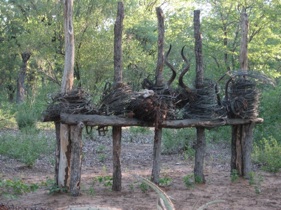Mozambique


The role of social and technical innovations in resolving
competing claims over natural resources
As a result of the implementation of the Limpopo National Park in 2001, population resettlement is planned for 7,000 of the 27,000 people currently living inside the park boundaries. The resettlement initiative is being promoted as a development project according to World Bank policy standards, but resettlement is widely known to be associated with a series of negative livelihood impacts. In order to understand these risks imposed by resettlement from the Limpopo National Park, this interdisciplinary research aims to analyze the process of negotiation and decision-making that determines the conditions under which resettlement will occur, and quantify the differences in availability of natural and non-natural resources between the pre- and post-resettlement sites. 

This research also engages in designing alternatives for mitigating risks placed on food security by this change in access to resources, specifically the potential for improved germplasm to increase maize production under drought conditions.
PhD researcher: Jessica Milgroom (MSc).
Co-funded by > WCS-AHEAD seed grants programme.
click on
this side bar to return to >projects


Snares exhibition at Chicumbane gate
Limpopo National Park, Mozambique
(© Judith de Wolf)